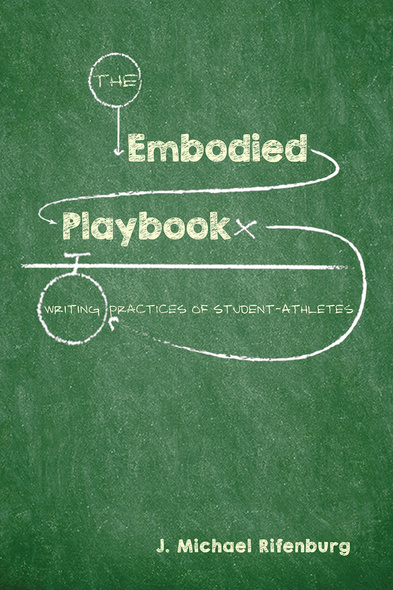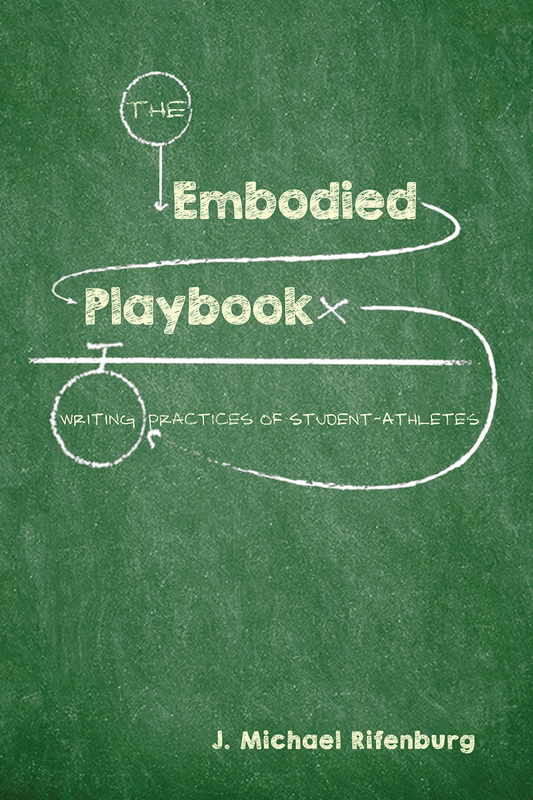Our shopping cart is currently down. To place an order, please contact our distributor, UTP Distribution, directly at utpbooks@utpress.utoronto.ca.

The Embodied Playbook
Writing Practices of Student-Athletes
The Embodied Playbook discovers a new approach to understanding student literacy in a surprising place: the university athletics department. Through analysis of a yearlong case study of the men’s basketball team at the University of North Georgia, J. Michael Rifenburg shows that a deeper and more refined understanding of how humans learn through physical action can help writing instructors reach a greater range of students.
Drawing from research on embodiment theory, the nature and function of background knowledge, jazz improvisation, and other unexpected domains, The Embodied Playbook examines a valuable but unexplored form of literacy: the form used by student-athletes when learning and using scripted plays. All students’ extracurricular prior knowledge is vital for the work they undertake in the classroom, and student-athletes understand the strengths and constraints of written text much as they understand the text of game plays: through embodying text and performing it in a competitive space. The book focuses on three questions: What are plays and what do they do? How do student-athletes learn plays? How can teachers of composition and rhetoric better connect with student-athletes?
The Embodied Playbook reveals the literacy of the body as a rich and untapped resource for writing instruction. Given the numbers of students who are involved in athletics, whether intramural, community-related, or extracurricular, Rifenburg’s conclusions hold important implications not only for how we define literacy but also for how writing programs can serve all of their students most effectively.
Even sports-loving academics tend to relish the dirty secrets coming out of big-time sports programs, but in this case, the dirty secret is that students playing for high-profile athletic programs actually possess ways of learning and knowing that we may not have tapped into. Rifenburg’s book reveals how effective coaching pedagogies and writing center pedagogies that leverage improvisation can support the multi-modal literacies of the playbook and contribute to student writing development. The Embodied Playbook 'gives voice to embodied knowledge' in ways that help us better understand and respect the collegiate athlete’s experiences.'
—Michele Eodice, University of Oklahoma
'In this important book, Michael Rifenburg asks how student-athletes learn to write. The answers Rifenburg offers are intelligent, insightful, and ultimately wise, drawing upon existing composition theory and pedagogy and his own meticulous research, but also upon the unique knowledge and practices that student-athletes bring with them to the writing class. The Embodied Playbook should be read by everyone teaching student-athletes, and by anyone interested in how literacy is learned within and beyond the classroom.'
—John Duffy, University of Notre Dame
'The Embodied Playbook really gave me some great perspectives on the histories of student athletes and the everyday rhetorics they practice that may be hidden in the academic sphere. It gave me a new perspective on the experiences those students face.'
—Abbie Levesque, PhD Student, Northeastern University
‘A model for thinking about matter, mind, and underexplored student expertise.’
—Reflective Teaching
'Thorough, intriguing, and compelling, and anyone who works with student-athletes would do well to add it to their resources.'
—The Sport Literature Association
‘The Embodied Playbook is very much worth the read for anyone interested in the rhetorics, pedagogies, and literacies of the human body. . . . This book provides a way for writing teachers to understand and assist the wide variety of students in our classrooms.’
—National Council of Teachers of English




